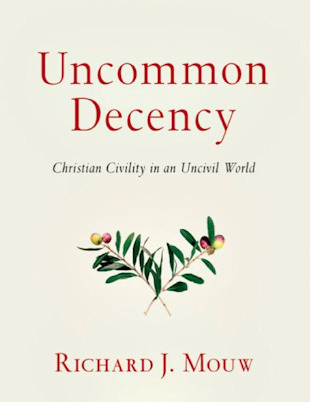"We were created for kind and gentle living," writes Richard Mouw, who served as president of Fuller Theological Seminary for twenty years. "It is not enough merely to reclaim civility. We need to cultivate a civility that does not play fast and loose with the truth." This savvy evangelical Christian knows what he is talking about. He is a leader in interfaith conversations, particularly with Mormons, Jewish groups, and Reformed Catholics.
Mouw is the author of over 20 books on topics of social ethics, philosophy of culture, and the Christian faith. In our review of Praying at Burger King, we saluted him for standing out as a reasonable believer who always has something edifying and imaginative to say about popular culture and the Christian path. We loved this gem: "There is no place in all creation that is outside the scope of God's mercies — not even a Burger King." Here in this fast food haven Mouw discovers and rejoices in his view of every human as a divine work of art, even when they have greasy hands, talk too loudly, or throw their trash out the windows of their cars.
In Uncommon Decency, he challenges us "to reflect the kindness and gentleness of God" and to respect the dignity of strangers whose beliefs and actions may be quite different from ours. How do we achieve these two objectives as we engage in political or ethical conversations with those outside our family or community circle? We can practice civility through deep listening, empathy, curiosity, and teachability.
We were elated to read Mouw's affirmation and delight in pluralism and diversity:
"Immersion in a world of seemingly infinite options — this is the pluralistic consciousness… . Whenever we Christians celebrate our freedom to worship God as we please and live our lives in the light of our deepest convictions, we are actually rejoicing over our uniquely pluralistic consciousness."
After following this with knotty probes of being civil about sex, ways to deal with other religions, and the nature of Christian religious leadership, Mouw explores the difficulties of understanding how to act when civility is not enough. Here he discusses the might of grace and the belief in hell. Next, Mouw praises the Mennonite practice of living "in the time of God's patience."
The book ends with this fine affirmation of civility, patience, and surprise:
"This is what civility comes to, finally: an openness to God's surprises. When that openness marks our lives, we have learned patience — along with the flexibility and tentativeness and humility and awe and modesty that will inevitably come to the patient heart. And since none of this is possible without a clear sense of who we are, and to whom we belong, the patient heart will also be a place where convictedness has found its home."
